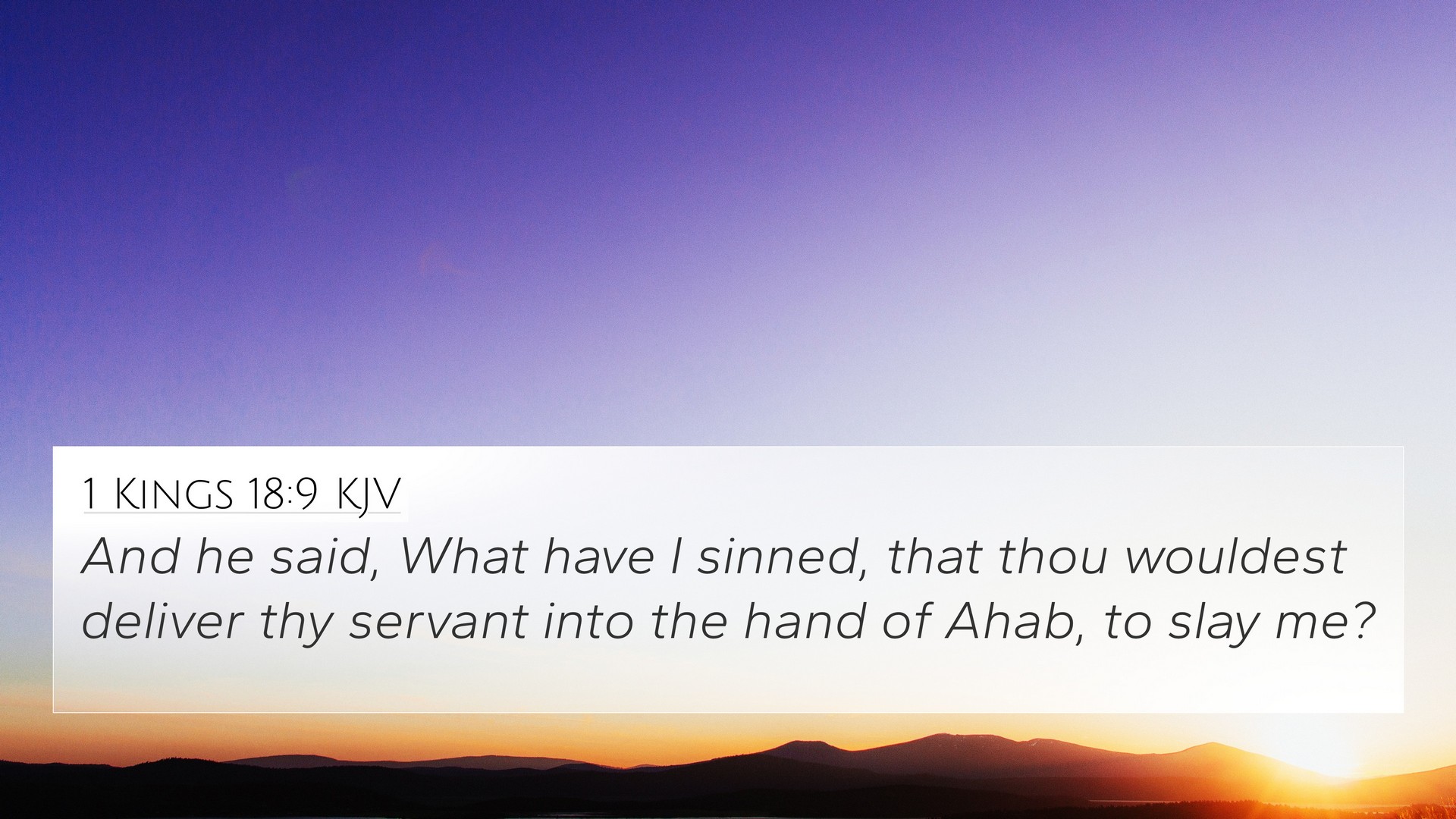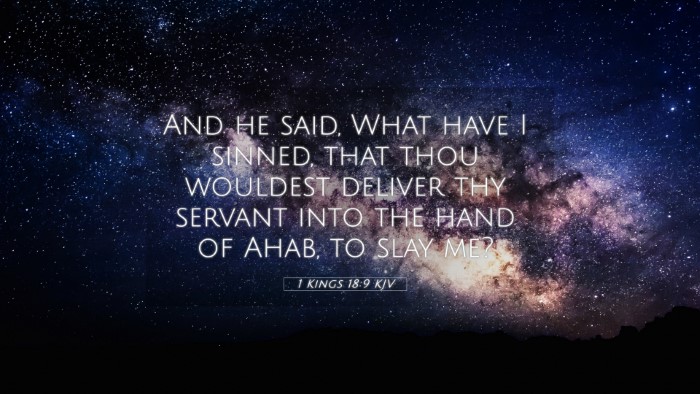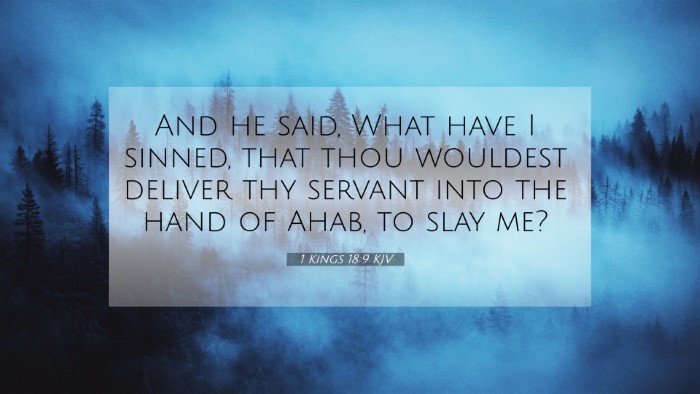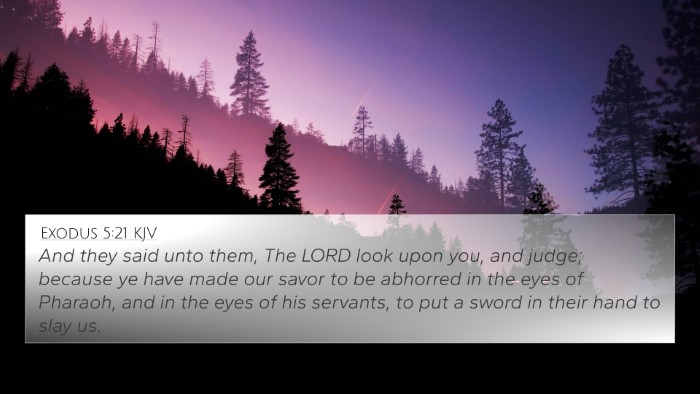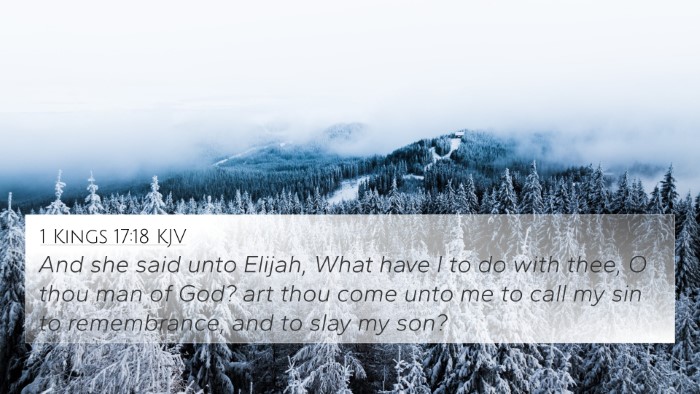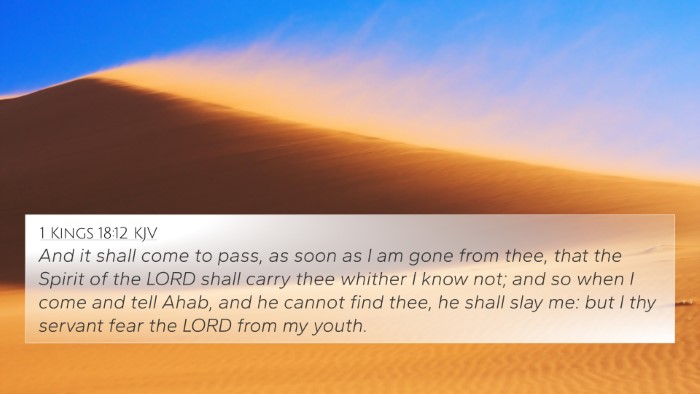Understanding 1 Kings 18:9
1 Kings 18:9 states: "And he said, What have I sinned, that thou wouldest deliver thy servant into the hand of Ahab, to slay me?"
This verse captures a moment in the narrative of Elijah, highlighting his fear and concern as he confronts the king of Israel, Ahab.
The events surrounding this verse are crucial in understanding Elijah's role as a prophet and the challenging environment he navigated.
Summary of the Verse
This quote reflects Elijah’s feelings of vulnerability, expressing a profound sense of personal danger. In asking "What have I sinned?",
Elijah is questioning the motives behind his predicament, emphasizing his innocence amidst a corrupt political landscape.
Commentary Insights
- Matthew Henry's Commentary:
Henry explores Elijah’s prophetic call and his courage to confront Ahab. He emphasizes that Elijah’s righteousness made him a target in a corrupt society,
and he acknowledges the heavy burden of prophetic ministry.
- Albert Barnes' Notes:
Barnes highlights the tension present in this exchange between Elijah and Ahab. He notes that this interaction showcases
the recurring theme of God's prophets being at odds with earthly rulers, underscoring the faithfulness of Elijah amidst adversity.
- Adam Clarke's Commentary:
Clarke delves into the implications of Ahab’s actions, detailing how Elijah's faith set him apart. He conveys Elijah's
disbelief at being delivered to Ahab, illustrating the prophet's ongoing struggle with fear and faith.
Key Themes
- Vulnerability in Faith:
This verse highlights the feelings of fear and potential despair that can accompany those who serve God, especially
in hostile environments.
- Prophetic Integrity:
Elijah’s plea reveals his commitment to righteousness and truth, serving as a reminder of the cost of prophetic callings.
- Conflict with Authority:
The interaction between Elijah and Ahab exemplifies the broader biblical theme of the struggle between divine truth and
human authority, particularly in the context of Israel's idolatry.
Cross-References and Thematic Connections
In understanding 1 Kings 18:9, the following cross-references can provide deeper insight:
- 1 Kings 17:1 - Elijah proclaims a drought, upsetting Ahab.
- James 5:17-18 - Highlights Elijah's fervent prayers and their impact.
- Matthew 10:28 - Jesus teaches about the fear of those who can kill the body.
- Luke 4:25-26 - Jesus references Elijah and the widow of Zarephath.
- Romans 11:3 - Paul discusses the remnant of believers during Elijah's time.
- Exodus 3:11 - Moses questions his call, similar to Elijah's inquiries.
- Jeremiah 1:6 - The call of Jeremiah and his initial fears echo Elijah's situation.
Further Study and Tools for Cross-Referencing
Engaging in cross-referencing biblical texts can enhance understanding significantly. Below are some suggested tools and methods:
- Bible Concordance: A comprehensive index to locate different verses based on keywords.
- Cross-Reference Bible Study: Employing guides that suggest connections between verses can reveal themes.
- Bible Reference Resources: Resources that compile various cross-references can facilitate thematic studies.
Connective Thoughts and Study Methods
As students of the Bible seek to understand deeper connections, employing different study methods can yield significant insights:
- Identify connections between Old and New Testaments to grasp the continuous narrative.
- Explore parallels within the Psalms and the teachings of the New Testament for thematic depth.
- Employ comparative studies of the Pauline epistles and their messages of faith and perseverance.
User Intent Insights
For those seeking deeper understanding, consider how to find specific cross-references for 1 Kings 18:9. This verse connects to various themes of challenge, faith, and God’s call. Understand how this verse interacts with others by asking:
- What verses relate to it in terms of faith and fear?
- How do various prophets respond to authority similarly?
- What additional narratives support the themes presented in 1 Kings 18:9?
Conclusion
1 Kings 18:9 offers rich insight into the life of Elijah, presenting a moment of deep fear intertwined with faith.
By exploring related verses and themes through the tools of cross-referencing, learners can grasp a fuller picture of the biblical narrative.
